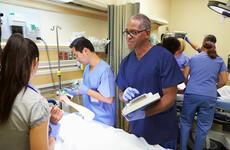15.777 Healthcare Lab: Introduction to Healthcare Delivery in the United States
In Healthcare Lab, students explore how the healthcare industry really works—and how they can shape its future. In this course, they tackle financial flows, insurance design, data privacy, consumer behavior, and innovation through a real-world Action Learning project, cases, and guest lectures with startups and major players. Whether they’re launching a venture or leading change in MedTech, pharma, or care delivery, this course gives them the tools to ask the right business questions and make an impact.
For their projects, Healthcare Lab students work with host companies to find actionable solutions to real challenges in the healthcare field, and to make improvements in analytics, operations management, IT, marketing, and many other areas, with one ultimate goal: to improve the quality of healthcare and patient outcomes.
Guest speakers come from many areas of the U.S. health delivery system:
- Health systems such as Mass General Brigham and Dana Farber Cancer Institute
- Digital healthcare delivery innovators such as Amwell and Buoy Health
- Healthcare leaders focused on quality, information technology, AI, operational strategy, and healthcare ecosystem transformation
Action Learning projects provide students hands on experience that will prepare them for the very real challenges that face the healthcare industry. And through these students' experiences, healthcare organizations, employees, and patients ultimately benefit.
H-Lab spotlight

-
MIT Sloan Health Systems Initiative Healthcare Lab Poster Session: Eight Student Teams Presented Results of their Real-world Projects
-
MIT Sloan Health Systems Initiative Healthcare Lab Teams Spend Time in the ED to Reduce Length of Stay
-
Video WATCH: MIT Sloan Health Systems Initiative director Anne Quaadgras on Healthcare Lab
-
Video WATCH: Healthcare Lab Action Learning at MGH
-
Video Healthcare Lab: MIT Students change health organizations and systems
-
Ideas Made to Matter How a nonprofit meals provider will triple the people it serves






